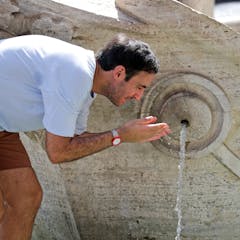
Artículos sobre Climate change
Mostrando 4941 - 4960 de 6819 artículos

Why is it so hard to reach consensus about how to slow climate change? Multiple time lags get in the way: some make it hard to convey the risk, while others prolong the search for solutions.

The Trump administration’s decision to dismiss or accept a government-prepared climate report will have life-or-death consequences, says a climate scientist involved in the previous report.

Eleven years after its release, An Inconvenient Truth, the iconic climate documentary, has spawned a sequel. But did the original do more harm than good by polarizing Americans on climate change?

When artists and scientists get together, they fuel each other’s creativity and inquiry.

Taking inspiration from the spread of world religions, Quentin Atkinson and Shaun Hendy argue scientists need to do more to signal commitment to ideas they want to spread.

A new lawsuit against the CBA puts climate change in a new legal light: a financial hazard. The case opens up fresh lines of attack on institutions that contribute to climate change.

Heavy rains, poor and clogged drainage systems have made many towns and cities in Nigeria susceptible to massive flooding.

Al Gore’s An Inconvenient Truth woke up the world to climate change. But with its sequel hitting cinemas now, it’s not clear that ‘big issue’ documentaries make a difference in the long term.

While climate denialism impedes policymaking in both the US and Australia, there are key differences in their political and public cultures.

Why assembling two teams to debate climate change is all about political spectacle and sowing doubt – and has nothing to do with actual climate science.

People universally believe scientists’ solar eclipse calendars, but vaccine warnings or climate predictions are forms of science that strangely do not enjoy equivalent acceptance.

Climate scientist Mark Maslin interviewed the former US vice-president about his new film, An Inconvenient Sequel.

Science provides a useful way to explore and understand the natural world. But it also has a richness, diversity and creativity that is often overlooked.

When utilities plan investments, they think decades ahead. A recent study shows why power companies should be spending more on renewables despite the Trump administration’s tilt toward fossil fuels.

Parts of Europe are having a devastatingly hot summer. Already we’ve seen heat records topple in western Europe in June, and now a heatwave nicknamed “Lucifer” is bringing stifling conditions to areas…

An experiment in getting people to care about climate change uses slick videos, charismatic scientists and calls to action.

Climate change is making heat waves more frequent and intense around the world. Cities are hotter than surrounding areas, so urban dwellers – especially minorities and the poor – are at greatest risk.

A new framework has been developed to identify wildlife populations under threat.

Trump administration officials argue that states can regulate more effectively than the federal government. But without leadership from the top, federalism may allow red states to avoid acting.

Major airports around the world will see more frequent flight restrictions in the coming decades because of increasingly common hot temperatures.
